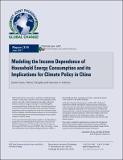| dc.contributor.author | Caron, J. | |
| dc.contributor.author | Karplus, V.J. | |
| dc.contributor.author | Schwarz, G.A. | |
| dc.date.accessioned | 2017-10-06T21:23:48Z | |
| dc.date.available | 2017-10-06T21:23:48Z | |
| dc.date.issued | 2017-07 | |
| dc.identifier.uri | http://hdl.handle.net/1721.1/111814 | |
| dc.description.abstract | We estimate Engel Curves based on Chinese household microdata and show in general equilibrium simulations that they imply substantially lower energy demand and CO2 emissions, relative to projections based on standard assumptions of unitary income elasticity. Income-driven shifts in consumption reduce the average welfare cost of emissions pricing by more than half. Climate policy is also less regressive, as rising income leads to rapid convergence in the energy intensity of consumption baskets and more evenly distributed welfare loss across households. Our findings underscore the importance of correctly accounting for the relationship between income and energy demand in high-growth economies. | en_US |
| dc.description.sponsorship | The authors gratefully acknowledge the support of Eni S.p.A., the French Development Agency (AFD), ICF International, and Shell International Limited, founding sponsors of the China Energy and Climate Project. We further thank the MIT Joint Program on the Science and Policy of Global Change for support through a consortium of industrial sponsors and Federal grants. Giacomo Schwarz was also supported by the SNSF (Swiss National Science Foundation). | en_US |
| dc.language.iso | en_US | en_US |
| dc.publisher | MIT Joint Program on the Science and Policy of Global Change | en_US |
| dc.relation.ispartofseries | MIT Joint Program Report Series;314 | |
| dc.title | Modeling the Income Dependence of Household Energy Consumption and its Implications for Climate Policy in China | en_US |
| dc.type | Working Paper | en_US |
| dc.identifier.citation | Report 314 | en_US |
